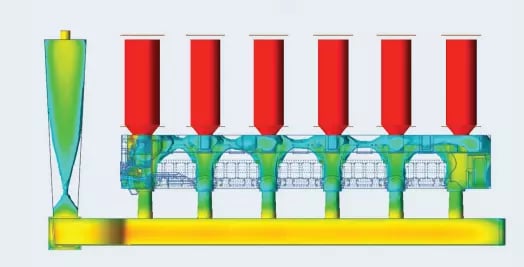Hadleigh Castings
MANUFACTURING A PROFIT
MINIMIZING COSTS AND MAXIMIZING YIELD WITH A SIMULATION APPROACH FOR CASTING METHODS DEVELOPMENT
About the Customer
Hadleigh Castings is a leading manufacturer of high-quality cast metal products. With a focus on innovation and excellence, the company uses state-of-the-art casting techniques to produce a wide range of products for a diverse customer base. From intricate engineering components to simple decorative items, Hadleigh Castings delivers quality and reliability in every product it creates.
Their Challenge
Casted parts need to meet rigorous quality, safety and performance standards. The traditional
process for development, which relies on the tribal knowledge of specialist metallurgists, can
results in expensive trial and error practices. Rework is commonplace and patterns often need to go back to the design phase to add riser, sleeves, widen the ingate and more to get the cast product to a sufficient standard. A process which takes time and can add significant cost. Hadleigh Castings relied heavily on the experience of its specialist metallurgist to develop its methods, however, when this expert retired, the company was left with a significant skills gaps that proved extremely hard to replace.
Our Solution
Following an extensive review of the casting simulation solutions on the market, Hadleigh Castings opted to trail Altair® Inspire™ Cast. During the trial, the first test case was a motorsport lower crankcase sump casting which used a 3D printed mold. The component would traditionally make use of several chillers along its length during the metal pouring process to ensure the liquid cools at the ideal rate, however, the use of these chillers can be expensive, especially when using a 3D printed mold. Inspire Cast was used by Hadleigh’s in-house team to simulate the casting process and identify any potential defects such as air entrapment, shrinkage porosity, cold shuts, or mold degradation. To the team’s surprise, Inspire Cast demonstrated that the casting did not actually require any risers or chillers to achieve the product quality the client required. This made the mold design easier to manufacture and more cost effective than previous solutions.
Results
The team is now able to experiment with the methods prior to manufacturing, identify common
casting defects and solve them prior to physical molds being created. Since adopting Inspire Cast, the company now has a perfect record of getting their castings right first time. With
simulation now a standard part of Hadleigh Castings services, even supplying clients with simulation reports as part of their services is simple. The success of the removal of chillers from the motorsport lowercrank case sump has prompted its team to revisit past methods to see if they can also benefit from simplification of the manufacturing process. Inspire Cast has enabled the company to maximize its offering, cut down on raw material losses, and reduce the time and cost of its development process.

Fig 1: Rapidly simulating the solidification process

"Since using Inspire Cast the cost
savings in raw materials, increased
productivity, improved quality
and accuracy are substantial.
We have worked all these years
without simulation – how did we
ever manage? Now it’s an integral
part of our business process."
Patrick Spatchett,
Engineering / Process
Development Manager,
Hadleigh Castings Ltd
